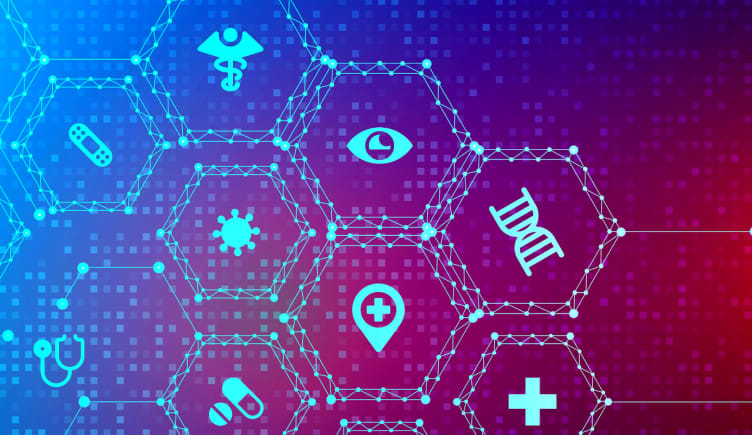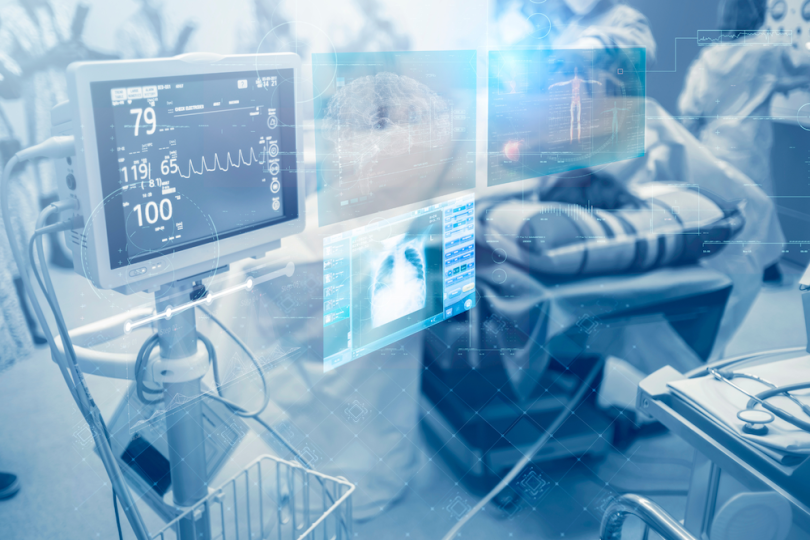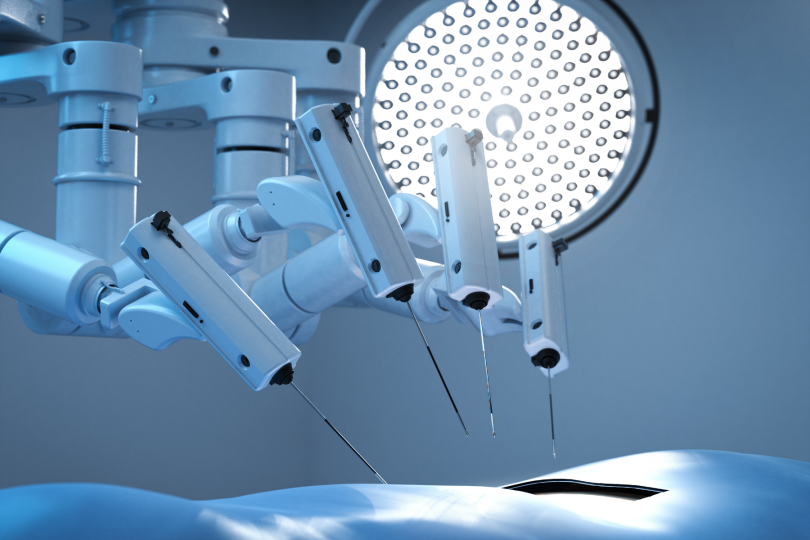Artificial Intelligence in Healthcare
Artificial Intelligence in Healthcare: 39 Examples Improving the Future of Medicine
From faster diagnoses to robot-assisted surgeries, the adoption of AI in healthcare is advancing medical treatment and patient experiences.

Artificial intelligence simplifies the lives of patients, doctors and hospital administrators by performing tasks that are typically done by humans, but in less time and at a fraction of the cost.
AI in healthcare shows up in a number of ways, such as finding new links between genetic codes, powering surgery-assisting robots, automating administrative tasks, personalizing treatment options and much more.
AI IN HEALTHCARE APPLICATIONS
- Improving medical diagnosis
- Speeding up drug discovery
- Transforming patient experience
- Managing healthcare data
- Performing robotic surgery
Put simply, AI is reinventing — and reinvigorating — modern healthcare through machines that can predict, comprehend, learn and act.
To give you a better understanding of the rapidly evolving field, we rounded up some of the top examples of AI in healthcare — as well as the companies that are leading the way.
 Image: Shutterstock
Image: Shutterstock
Examples of AI in Medical Diagnosis
Every year, roughly 400,000 hospitalized patients suffer preventable harm, with 100,000 deaths. In light of that, the promise of improving the diagnostic process is one of AI’s most exciting healthcare applications.
Incomplete medical histories and large caseloads can lead to deadly human errors. Immune to those variables, AI can predict and diagnose disease at a faster rate than most medical professionals.
Here are 13 examples of companies showing AI’s ability to reduce errors and save lives.
Linus Health
Location: Boston, Massachusetts
With its early-detection platform for cognitive assessments, Linus Health is on a mission to modernize brain health. Its proprietary assessment technology DCTclock takes the gold standard pen-and paper clock drawing test for early signs of cognitive impairment and digitizes it, bringing together the most recent advances in neuroscience and AI to analyze over 50 metrics that reflect the patient’s cognitive function.
They're Hiring | View 5 Jobs
Viz.ai
Location: San Francisco, California
In healthcare, delays can mean the difference between life and death, so Viz.ai helps care teams react faster with AI-powered healthcare solutions. The company’s AI products can detect issues and notify care teams quickly, enabling providers to discuss options, provide faster treatment decisions, thus saving lives.
They're Hiring | View 0 Jobs
PathAI
Location: Boston, Massachusetts
PathAI develops machine learning technology to assist pathologists in making more accurate diagnoses. The company’s current goals include reducing error in cancer diagnosis and developing methods for individualized medical treatment. PathAI worked with drug developers like Bristol-Myers Squibb and organizations like the Bill & Melinda Gates Foundation to expand its AI technology into other healthcare industries.
They're Hiring | View 0 Jobs
Regard
Location: Los Angeles, California
The healthtech startup Regard uses AI technology to diagnose patients. The company describes its automated system to be the “clinical co-pilot” to electronic medical records (EMRs). The data from EMRs is synthesized to discover a diagnosis. Additionally, healthcare providers receive specific recommendations about patient care. The system also updates patient documents automatically to reduce burnout among healthcare workers.
They're Hiring | View 0 Jobs
READ MORE
94 Top Healthcare Startups and Healthtech Companies
Buoy Health
Location: Boston, Massachusetts
Developed by a team out of Harvard Medical School, Buoy Health is an AI-based symptom and cure checker that uses algorithms to diagnose and treat illness. Here’s how it works: a chatbot listens to a patient’s symptoms and health concerns, then guides that patient to the correct care based on its diagnosis.
They're Hiring | View 0 Jobs
Enlitic
Location: Fort Collins, Colorado
Enlitic develops deep learning medical tools to streamline radiology diagnoses. The company’s deep learning platform analyzes unstructured medical data — radiology images, blood tests, EKGs, genomics, patient medical history — to give doctors better insight into a patient’s real-time needs.
They're Hiring | View 0 Jobs
Freenome
Location: San Francisco, California
Freenome uses AI in screenings, diagnostic tests and blood work to test for cancer. By deploying AI at general screenings, Freenome aims to detect cancer in its earliest stages and subsequently develop new treatments.
They're Hiring | View 24 Jobs
Beth Israel Deaconess Medical Center
Location: Boston, Massachusetts
Harvard University’s teaching hospital, Beth Israel Deaconess Medical Center, used AI for diagnosing potentially deadly blood diseases at an early stage. Doctors developed AI-enhanced microscopes to scan for harmful bacterias like E. coli and staphylococcus in blood samples at a faster rate than is possible using manual scanning. The scientists used 25,000 images of blood samples to teach the machines how to search for bacteria. The machines then learned how to identify and predict harmful bacteria in blood with 95 percent accuracy.
They're Hiring | View 0 Jobs
Iterative Health
Location: Cambridge, Massachusetts
Iterative Health applies AI to gastroenterology to improve disease diagnosis and treatment. The company’s AI Recruitment service uses computational algorithms to automate the process of identifying patients who are eligible to be potential candidates for inflammatory bowel disease clinical trials. Iterative Health also produces SKOUT, a tool that uses AI to help doctors identify potentially cancerous polyps.
They're Hiring | View 6 Jobs
VirtuSense
Location: Peoria, Illinois
VirtuSense uses AI sensors to track a patient’s movements so that providers and caregivers can be notified of potential falls. The company’s products include VSTAlert, which can predict when a patient intends to stand up and notify appropriate medical staff, and VST Balance, which employs AI and machine vision to analyze a person’s risk of falling within the next year.
They're Hiring | View 0 Jobs
Caption Health
Location: San Mateo, California
Caption Health combines AI and ultrasound technology for early disease identification. AI guides providers through the ultrasound process in real time to produce diagnostic-quality images that the software then helps to interpret and assess.
They're Hiring | View 0 Jobs
Arterys
Location: San Francisco, California
Arterys creates products for precision medicine. Its medical imaging AI platform can be used for detecting breast cancer, analyzing cardiac MRI images, reading emergency department X-rays, tracking lung nodules, diagnosing brain tumors and detecting strokes.
They're Hiring | View 0 Jobs
Cleerly, Inc.
Location: Fully Remote
Cleerly makes AI technology to improve cardiovascular care. The company’s AI-enabled digital care platform measures and analyzes atherosclerosis, which is a buildup of plaque in the heart’s arteries. The technology is able to determine an individual’s risk of having a heart attack and recommend a personalized treatment plan.
They're Hiring | View 0 Jobs
 Image: Shutterstock
Image: Shutterstock
Examples of AI in Drug Discovery
The drug development industry is bogged down by skyrocketing development costs and research that takes thousands of human hours. Putting each drug through clinical trials costs an estimated average of $1.3 billion, and only 10 percent of those drugs are successfully brought to market.
Due to breakthroughs in technology, biopharmaceutical companies are quickly taking notice of the efficiency, accuracy and knowledge AI can provide.
Here are some companies that rely on AI to develop the next wave of medicines.
BioXcel Therapeutics
Location: New Haven, Connecticut
BioXcel Therapeutics uses AI to identify and develop new medicines in the fields of immuno-oncology and neuroscience. Additionally, the company’s drug re-innovation program employs AI to find new applications for existing drugs or to identify new patients.
They're Hiring | View 0 Jobs
Reverie Labs
Location: Cambridge, Massachusetts
Reverie Labs is a pharmaceutical company harnessing computational chemistry and machine learning tools for drug discovery and design. It uses predictive analytics tools and expansive databases, with the ultimate goal of learning more about cancer and developing effective cancer treatments.
They're Hiring | View 0 Jobs
READ NEXT
10 Examples of Wearable Technology in Healthcare and Wearable Medical Devices
Valo Health
Location: Boston, Massachusetts
Valo uses artificial intelligence to achieve its mission of transforming the drug discovery and development process. With its Opal Computational Platform, Valo collects human-centric data to identify common diseases among a specific phenotype, genotype and other links, which eliminates the need for animal testing. The company then establishes the molecule design and clinical development.
They're Hiring | View 3 Jobs
XtalPi
Location: Cambridge, Massachusetts
Combining AI, the cloud and quantum physics, XtalPi’s ID4 platform predicts the chemical and pharmaceutical properties of small-molecule candidates for drug design and development. The company’s investors have included Google, Tencent and Sequoia Capital.
They're Hiring | View 0 Jobs
Atomwise
Location: San Francisco, California
Atomwise uses AI to tackle serious diseases, including Ebola and multiple sclerosis. The company’s neural network, AtomNet, helps predict bioactivity and identify patient characteristics for clinical trials. Atomwise’s AI technology screens between 10 and 20 million genetic compounds each day and can reportedly deliver results 100 times faster than traditional pharmaceutical companies.
They're Hiring | View 2 Jobs
Deep Genomics
Location: Fully Remote
Deep Genomics’ AI platform helps researchers find candidates for developmental drugs related to neuromuscular and neurodegenerative disorders. Finding the right candidates during a drug’s development statistically raises the chances of successfully passing clinical trials while also decreasing time and cost to market.
They're Hiring | View 0 Jobs
BenevolentAI
Location: London, England
The primary goal of BenevolentAI is to get the right treatment to the right patients at the right time by using AI to produce a better target selection and provide previously undiscovered insights through deep learning. BenevolentAI works with major pharmaceutical groups to license drugs, while also partnering with charities to develop easily transportable medicines for rare diseases.
They're Hiring | View 1 Jobs
Deepcell, Inc.
Location: Menlo Park, California
Deepcell uses artificial intelligence and microfluidics to develop technology for single cell morphology. The company’s platform has a variety of applications, including cancer research, cell therapy and developmental biology.
They're Hiring | View 4 Jobs
Owkin
Location: New York, New York
Owkin leverages AI technology for drug discovery and diagnostics with the goal of enhancing cancer treatment. The company’s AI tools help identify new drug targets, recommend possible drug combinations and suggest additional diseases that a drug can be repurposed to treat. Owkin also produces RlapsRisk, a diagnostic tool for assessing a breast cancer patient’s risk of relapse, and MSIntuit, a tool that assists with screening for colorectal cancer.
They're Hiring | View 0 Jobs
 Image: Shutterstock
Image: Shutterstock
Examples of AI Transforming Patient Experience
In the healthcare industry, time is money. Efficiently providing a seamless patient experience allows hospitals, clinics and physicians to treat more patients on a daily basis. Studies show hospitals whose patients have positive experiences have higher profits, while negative reviews can lead to financial losses.
We’ve rounded up some examples of how AI is helping healthcare facilities better manage patient flow.
Iodine Software
Location: Austin, Texas
With the goal of improving patient care, Iodine Software is creating AI-powered and machine-learning solutions for mid-revenue cycle leakages, like resource optimization and increased response rates. The company’s CognitiveML product discovers client insights, ensures documentation accuracy and highlights missing information.
They're Hiring | View 22 Jobs
Kaia Health
Location: New York, New York
Kaia Health operates a digital therapeutics platform that features live physical therapists to provide people care within the boundaries of their schedules. The platform includes personalized programs with case reviews, exercise routines, relaxation activities and learning resources for treating chronic back pain and COPD. Kaia Health also features a PT-grade automated feedback coach that uses AI technology.
Spring Health
Location: New York, New York
Spring Health offers a mental health benefit solution employers can adapt to provide their employees with the resources to keep their mental health in check. The technology works by collecting a comprehensive dataset from each individual and comparing that against hundreds of thousands of other data points. The platform then uses a machine learning model to match people with the right specialist for either in-person care or telehealth appointments.
Twin Health
Location: Mountain View, California
Twin Health’s holistic method seeks to address and potentially reverse chronic conditions like Type 2 Diabetes through a mixture of IoT tech, AI, data science, medical science and healthcare. The company created the Whole Body Digital Twin — a digital representation of human metabolic function built around thousands of health data points, daily activities and personal preference.
Olive
Location: Columbus, Ohio
Olive’s AI platform automates repetitive healthcare tasks, freeing up administrators to work on higher-level ones. The platform automates everything from eligibility checks to un-adjudicated claims and data migrations so staffers can focus on patient service.
Qventus, Inc
Location: Mountain View, California
Qventus is an AI-based software platform that solves operational challenges, including those related to emergency rooms and patient safety. The company’s automated platform can prioritize patient illness and injury and tracks hospital waiting times to help hospitals and health systems optimize care delivery.
Cleveland Clinic
Location: Cleveland, Ohio
The Cleveland Clinic teamed up with IBM on the Discovery Accelerator, an AI-infused initiative focused on faster healthcare breakthroughs. The joint center is building an infrastructure that supports research in areas such as genomics, chemical and drug discovery and population health. The collaboration employs big data medical research for the purpose of innovating patient care and approaches to public health threats.
Johns Hopkins Medicine
Location: Baltimore, Maryland
Johns Hopkins Hospital partnered with GE Healthcare to use predictive AI techniques to improve the efficiency of patient operational flow. A task force, augmented with AI, quickly prioritized hospital activity to benefit patients. Since implementing the program, the facility has assigned patients admitted to the emergency department to beds 38 percent faster.
They're Hiring | View 75 Jobs
Babylon
Location: Austin, Texas
Babylon is on a mission to reengineer healthcare by shifting the focus away from caring for the sick to helping prevent sickness, leading to better health and less health-related expenses. The platform features an AI engine created by doctors and deep learning scientists that operates an interactive symptom checker, using known symptoms and risk factors to provide the most informed and up-to-date medical information possible.
One Drop
Location: New York, New York
One Drop provides a discreet solution for managing chronic conditions like diabetes and high blood pressure, as well as weight management. The One Drop Premium app allows people to manage their conditions head first, offering interactive coaching from real-world professionals, predictive glucose readings powered by AI and data science, learning resources and daily tracking of readings taken from One Drop’s Bluetooth-enabled glucose reader and other devices.
CloudMedx
Location: Palo Alto, California
CloudMedX uses machine learning to generate insights for improving patient journeys throughout the healthcare system. The company’s technology helps hospitals and clinics manage patient data, clinical history and payment information by using predictive analytics to intervene at critical junctures in the patient care experience. Healthcare providers can use these insights to efficiently move patients through the system.
Subtle Medical
Location: Menlo Park, California
Subtle Medical uses AI to enhance images for radiology departments. The SubtlePET and SubtleMR products work with the machines a facility already uses to speed up MRI and PET scans while reducing image noise. The software has the potential to shrink wait times by scanning more patients each day.
Twill
Location: New York, New York
Twill describes itself as “The Intelligent Healing Company,” delivering digital healthcare products and partnering with enterprises, pharma companies and health plans to develop products using its Intelligent Healing Platform. The company uses AI to tailor personalized care tracks for managing medical conditions like multiple sclerosis and psoriasis. These individualized programs can include digital therapeutics, care communities and coaching options.
Augmedix
Location: San Francisco, California
Augmedix offers a suite of AI-enabled medical documentation tools for hospitals, health systems, individual physicians and group practices. The company says its products use natural language processing and automated speech recognition to save users time, increase productivity and improve patient satisfaction.
FURTHER READING
Cloud Computing in Healthcare: How It's Used and 10 Examples
 Image: Shutterstock
Image: Shutterstock
Examples of AI for Healthcare Data Management
Healthcare is widely considered one of the next big data frontiers to tame. Highly valuable information can sometimes get lost among the forest of trillions of data points. Additionally, the inability to connect important data points slows the development of new drugs, preventative medicine and proper diagnosis.
Many in healthcare are turning to AI as a way to stop the data hemorrhaging. The technology breaks down data silos and connects in minutes information that used to take years to process.
Here are eight examples of AI companies helping the healthcare industry stay afloat in an ocean of data.
Tempus
Location: Chicago, Illinois
Tempus uses AI to sift through the world’s largest collection of clinical and molecular data to personalize healthcare treatments. The company develops AI tools that give physicians insights into treatments and cures.
IBM
Location: Armonk, New York
Once known as a Jeopardy-winning supercomputer, IBM’s Watson now helps healthcare professionals harness their data to optimize hospital efficiency, better engage with patients and improve treatment. Watson applies its skills to everything from developing personalized health plans to interpreting genetic testing results and catching early signs of disease.
ClosedLoop
Location: Austin, Texas
ClosedLoop.ai is an end-to-end platform that uses AI to discover at-risk patients and recommend treatment options. Through the platform, healthcare organizations can receive personalized data about patients’ needs while collecting looped feedback, outreach and engagement strategies and digital therapeutics. The platform can be used by healthcare providers, payers, pharma and life science companies.
Beacon Biosignals
Location: Fully Remote
Beacon Biosignals aims to treat neurological and psychiatric diseases through its EEG analytics platform, which utilizes portal reporting, standardized neurobiomarkers and machine learning algorithms that “increase the probability of success at each stage of drug development.” Additionally, population stratification is used to identify various patient populations.
Proscia
Location: Philadelphia, Pennsylvania
Proscia is a digital pathology platform that uses AI to detect patterns in cancer cells. The company’s software helps pathology labs eliminate bottlenecks in data management and uses AI-powered image analysis to connect data points that support cancer discovery and treatment.
H2O.ai
Location: Mountain View, California
H2O.ai’s AI analyzes data throughout a healthcare system to mine, automate and predict processes. It has been used to predict ICU transfers, improve clinical workflows and pinpoint a patient’s risk of hospital-acquired infections. Using the company’s AI to mine health data, hospitals can predict and detect sepsis, which ultimately reduces death rates.
iCarbonX
Location: Shenzhen, China
ICarbonX uses AI and big data to look more closely at human life characteristics with its Digital Life Platform. By analyzing the health and actions of human beings in a “carbon cloud,” the company hopes its big data will help manage all aspects of health. ICarbonX believes its technology can gather enough data to better classify symptoms, develop treatment options and get people healthier.
AKASA
Location: San Francisco, California
AKASA’s AI platform helps healthcare providers streamline workflows by automating administrative tasks to allow staff to focus where they’re needed. The automation can be customized to meet a facility’s particular needs and priorities, while maintaining accuracy for managing claims, payments and other elements of the revenue cycle.

Examples of AI in Robotic Surgery
Popularity in robot-assisted surgery is skyrocketing. Hospitals are using robots to help with everything from minimally invasive procedures to open heart surgery. According to the Mayo Clinic, robots help doctors perform complex procedures with a precision, flexibility and control that goes beyond human capabilities.
Surgeons can control a robot’s mechanical arms while seated at a computer console as the robot gives the doctor a three dimensional, magnified view of the surgical site that surgeons could not get from relying on their eyes alone. The surgeon then leads other team members who work closely with the robot through the entire operation.
Robot-assisted surgeries have led to fewer surgery-related complications, less pain and a quicker recovery time. Take a look at five examples of how robots are shaping the future of surgery.
Vicarious Surgical
Location: Waltham, Massachusetts
Vicarious Surgical combines virtual reality with AI-enabled robots so surgeons can perform minimally invasive operations. Using the company’s technology, surgeons can virtually shrink and explore the inside of a patient’s body in detail. Vicarious Surgical’s technology concept prompted former Microsoft chief Bill Gates to invest in the company.




































